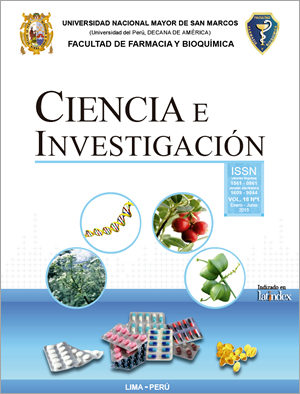Hepatoprotective effect of modified Aloe vera gel to lesions induced in mice with mixed overheated cooking oil with DMSO
DOI:
https://doi.org/10.15381/ci.v18i1.13600Keywords:
Hepatoprotective, Aloe vera, overheated cooking oilAbstract
The aim of this study was to evaluate the hepatoprotective effect of Aloe vera modified gel (MAVG) against the injury induced in albino mice by the oral administration of mixed overheated cooking oil (OCO) with dimethyl sulfoxide (DMSO) (1:1). OCO doses used were 2,3 and 3,1 mL/kg administered for 14 days, which produced increases of transaminases ALT, AST and triglycerides. For the specimens that received the lowest dose of OCO (2,3 mL/kg body weight), since day 14 and continuing for 18 days, were administered additionally four drops daily of MAVG equivalent to 6,1 ml/kg. When analyzing the results obtained at 14, 19, 28 and 33 days of starting treatment were observed significant progressive decrease in ALT, AST and triglycerides. However, the specimens that received the highest dose of OCO (3,1 ml/kg) plus MAVG, showed increase in the levels of ALT, AST and triglycerides over time, suggesting that the lipid peroxidation and free radicals formed exceed the hepatoprotective effect of MAVG. The protein levels did not change significantly. The mice of three control groups did not show significant variation in the biochemical indicators studied, however in control group that received MAVG, was observed a decrease of triglycerides. In conclusion, the MAVG presented hepatoprotective effect with a dose of OCO to 2,3 mL/Kg of weight, but it does not happen the same when was increased OCO (3,1 ml / kg of weight ), where the dose of MAVG was insufficient beacause MAVG the dose became insufficient.Downloads
Published
2015-06-15
Issue
Section
Artículos Originales
License
Copyright (c) 2015 Félix Saavedra, Gloria Gordillo, Haydée Zúñiga, José Apesteguía, Henry Ostos

This work is licensed under a Creative Commons Attribution-NonCommercial-ShareAlike 4.0 International License.
LOS AUTORES RETIENEN SUS DERECHOS:
- Los autores retienen sus derechos de marca y patente, y tambien sobre cualquier proceso o procedimiento descrito en el artículo.
- Los autores retienen el derecho de compartir, copiar, distribuir, ejecutar y comunicar públicamente el articulo publicado en la Revista Ciencia e Investigación (por ejemplo, colocarlo en un repositorio institucional o publicarlo en un libro), con un reconocimiento de su publicación inicial en la Revista Ciencia e Investigación.
- Los autores retienen el derecho a hacer una posterior publicación de su trabajo, de utilizar el artículo o cualquier parte de aquel (por ejemplo: una compilación de sus trabajos, notas para conferencias, tesis, o para un libro), siempre que indiquen la fuente de publicación (autores del trabajo, revista, volumen, numero y fecha).
How to Cite
1.
Saavedra F, Gordillo G, Zúñiga H, Apesteguía J, Ostos H. Hepatoprotective effect of modified Aloe vera gel to lesions induced in mice with mixed overheated cooking oil with DMSO. Ciencia e investigación [Internet]. 2015 Jun. 15 [cited 2024 Jul. 17];18(1):14-9. Available from: https://revistasinvestigacion.unmsm.edu.pe/index.php/farma/article/view/13600













